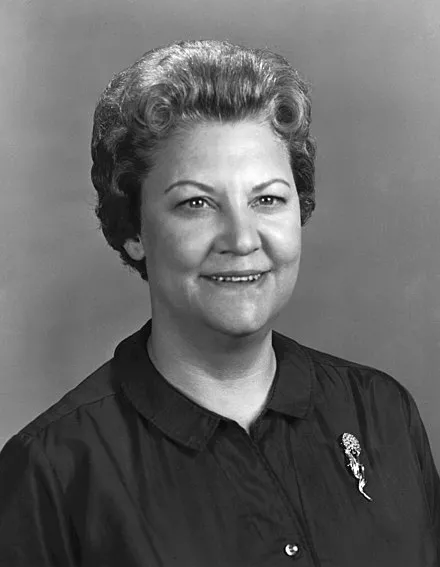'Once you get in the labor movement you can't get out. You get more and more interested.'

EDITOR'S NOTE: "This month is Women’s History Month, marking an annual acknowledgement of the vital contributions Women have made to our history that are far too often overlooked," AFL-CIO President Liz Shuler said. "Nowhere is it more true than in our Labor Movement. The truth is: You cannot write the story of Worker Power in this country without talking about the indispensable role Women have played in every step of the way." Today, we continue "Our Union Heroes" series which highlights outstanding Kentucky trade unionists, including Thelma Stovall, a member of the old Tobacco Workers Union and the first woman elected lieutenant governor in Kentucky. She was a tireless champion of union rights and women's rights. It is hoped that one day the Kentucky State AFL-CIO can create a Kentucky Labor Hall of Fame to permanently honor our union heroes.
By BERRY CRAIG
Alliance for Retired Americans
"She was as pro-labor as you can get and she stuck by that stand no matter what," The Frankfort State Journal editorialized after the Feb. 4, 1994, death of Thelma Stovall, a stalwart trade unionist and the first woman elected lieutenant governor in Kentucky.
Also a veteran Louisville Democratic politician, Stovall was a state representative, secretary of state and state treasurer before she was elected lieutenant governor in 1975--beating 10 men in the Democratic primary.
Stovall belonged to Louisville Tobacco Workers International Union Local 185. The TWIU merged with the Bakery and Confectionery Workers International Union of America in 1978. After a 1999 merger with the American Federation of Grain Millers, the BCT became the Bakery, Confectionery, Tobacco Workers and Grain Millers International Union (BCTGM).
Steve Barger, a longtime Louisville building trades union leader, agrees with the State Journal editorial. He recalls the time Stovall advised Gov. Julian Carroll, who was also elected in 1975, against approving some non-union repair work on the Capitol. (The Kentucky State AFL-CIO endorsed Carroll and Stovall.)
Stovall warned the governor that if unions protested the work with a picket line, she wouldn't cross it. "She just flat told the governor she wasn't coming to work," said Barger, who is retired but still active in the state labor movement and is treasure of the Kentucky Alliance for Retired Americans.
Apparently, the project was dropped. "Thelma Stovall always told you what she thought," Barger said.
The State Journal editorial also said Stovall "was rough around the edges and she knew it and didn't care. She was a Democrat through and through and didn't care."
Stovall was born Thelma Loyace Hawkins in Munfordville on April 1, 1919. Her parents divorced when she was eight, and she and her younger sister moved with their mother to Louisville.
"She watched her mother raise two children as a single parent during the Great Depression and accompanied her to work at the local voting precinct," according to the Louisville Encyclopedia. "At fifteen, to help with the families finances, [she] lied about her age to obtain a job sweeping loose tobacco at Brown & Williamson Tobacco Co."
She graduated from Louisville Girls High School, which, in 1934, moved to Halleck Hall, noted the encyclopedia. In 1936, she married Lonnie Raymond Stovall, who also worked at Brown & Williamson. The couple had no children.
Stovall was elected Local 185's recording secretary in 1945, a post she held for 11 years. "Through her work on the union's League for Political Education and in forming women's auxiliary groups around the state, Stovall became Jefferson County labor's choice to run for the state legislature in 1949," the encyclopedia says.
In a 1972 story, Stovall told the Louisville Courier-Journal's Sally Bly that she was "the only labor person in the [old 38th] district who had done anything political, and that was only as a precinct worker." Figuring she'd lose, she won "and became the first woman elected to the legislature from Jefferson County," Bly added. "And, at 30, she was also the youngest member of the legislature."
Stovall was elected to two more consecutive terms.
Stovall said to make herself a better lawmaker, she needed to better know the law. To that end, she studied law through Chicago's LaSalle Extension University and went to summer school at the University of Kentucky and Eastern Kentucky University, according to the encyclopedia.
She was elected secretary of state in 1955, when constitutional office holders were limited to one term. "For twenty years Stovall served as either secretary of state (1956-60, 1964-68 and 1972-75) or state treasurer (1960-64 and 1968-72)," according to the encyclopedia.
Stovall championed women's rights as well as union rights. In 1968, she helped start the Kentucky Commission on Women.
She fervently supported the Equal Rights Amendment and, in 1978, grabbed headlines nationally "when she assumed the role of governor in Carroll's absence and called a special session of the legislature to veto the rescission of its 1972 ratification of the ERA," says the encyclopedia.
"The simple statement contained within the Equal Rights Amendment, reads: 'Equality of rights under law shall not be denied or abridged by the United States or by any state on account of sex.' It carries only the promise of equal treatment and protection under the law. No one should seek more, and no government should afford less," she said.
Endorsed by the Kentucky State AFL-CIO, she tossed her hat in the ring for governor in the 1979 Democratic primary. "She has been in the labor movement long enough and in state government long enough that she has our trust to do whatever is right," Executive Secretary Leonard "Scottie" Smith told the Courier-Journal's Bob Johnson.
Even so the lost the four-way primary race to John Y. Brown Jr. Brown named her labor commissioner, her last job in state government, according to the encyclopedia.
"Once you get in the labor movement you can't get out," she said in a 1949 Courier-Journal article by Eleanor Yager. "You get more and more interested."